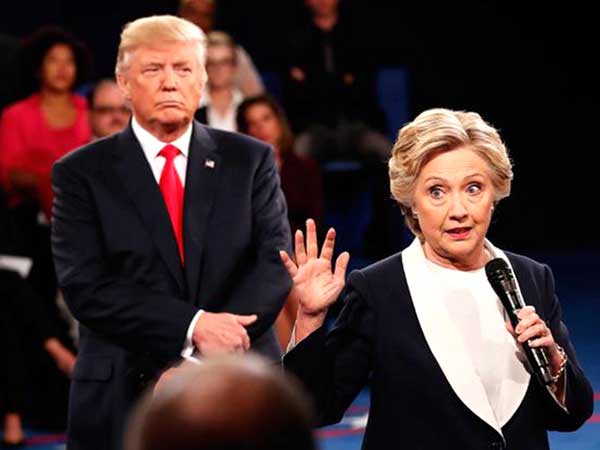當(dāng)前位置: Language Tips> 流行新詞
分享到
在美國(guó)大選投票臨近的關(guān)鍵時(shí)刻,兩位候選人的支持者們也在幕后積極地籌劃著——怎么能讓自己的一張選票發(fā)揮最大價(jià)值?于是,一些可以“互換選票”的社交網(wǎng)站和手機(jī)應(yīng)用產(chǎn)生了,并在多個(gè)州迅速躥紅。

為什么要“互換選票”?
Most Americans don't live in swing states, so while their votes will count, they won't be quite so important. But what if you could swap with someone planning to vote for a third-party candidate in a more relevant part of the country - making your ballot influential but still allowing the third-party voter to register their dissent?
大多數(shù)美國(guó)人并不住在搖擺州,所以盡管他們的選票也有用,但用處并沒(méi)有太大。但如果你和想要投票給第三方黨派的搖擺州選民互換選票呢?這就可以讓你的選票更有影響,同時(shí)也讓第三方黨派的投票者表達(dá)出他們的意見(jiàn)。
That's the idea behind several anti-Donald Trump vote-swapping websites and a phone app that has seen a spike in popularity heading into election day.
這就是幾個(gè)反對(duì)特朗普的互換選票網(wǎng)站和手機(jī)應(yīng)用的初衷。隨著大選的臨近,這些互換選票的網(wǎng)站和應(yīng)用也在美國(guó)躥紅。
來(lái)看看下面這個(gè)例子:
25-year-old Sadiq Khan is a Hillary Clinton supporter, but he doesn’t think his vote matters much, because he lives in New Jersey, a state that’s voted Democratic in the last six presidential elections… and is expected to do so again on Tuesday.
25歲的沙迪科?汗是希拉里的支持者,但是他認(rèn)為自己的選票對(duì)希拉里沒(méi)有多大用處,因?yàn)樗幼≡谛聺晌髦荩聺晌髟诖饲暗?屆總統(tǒng)大選中一直投票給民主黨,估計(jì)本屆應(yīng)該也是。
Now meet 23-year-old Anlin Wang. He prefers Green Party candidate Jill Stein.
再來(lái)看王安林。他支持的是綠黨候選人斯迪安。
But Wang lives in the battleground state of Pennsylvania, and he worries a vote for Stein instead of Clinton could help Donald Trump win his state.
但王安林居住在賓夕法尼亞州,是大選中的搖擺州。他擔(dān)心自己投票給斯迪安而不是希拉里會(huì)幫助特朗普在該州勝出。
Anlin Wang and Sadiq Khan had never met before, but they are trying to solve each other’s dilemmas by using a strategy called vote swapping.
雖然沙迪科和王安林從未見(jiàn)面,但他們嘗試通過(guò)“互換選票”的辦法來(lái)解決各自的問(wèn)題。
A handful of vote swapping websites, apps, and Facebook groups have sprung up this election year connecting voters from all over the country.
在今年,美國(guó)出現(xiàn)了數(shù)個(gè)互換選票的網(wǎng)站、手機(jī)應(yīng)用和臉譜網(wǎng)群組,將全國(guó)的選民聯(lián)系起來(lái)。
ANLIN WANG: I just made a post there. And said, “I live in PA. Willing to trade my vote.
“我發(fā)了一條信息說(shuō)‘我住在賓州,愿意換我的選票’。”王安林說(shuō)。
SADIQ KHAN: Quickly realized that we’d be good trading partners.
“我很快意識(shí)到我們可以互換選票。”沙迪科說(shuō)。
Khan agreed to vote for Jill Stein in New Jersey, and Wang, for Hillary Clinton in Pennsylvania. Both see this as a win.
沙迪科同意在新澤西投票給綠黨候選人斯迪安,王安林同意在賓州投票給希拉里。他們實(shí)現(xiàn)了合作雙贏。
“互換選票”的來(lái)源
According to Vox, this practice first came about in the 2000 election, when voter trading websites popped up to help Nader supporters in swing states make sure that their third-party vote didn’t help Bush get elected. This time around, the #NeverTrump app is an attractive option for voters who refuse to vote for Clinton but also fear a Trump victory.
據(jù)Vox網(wǎng)站報(bào)道,互換選票的做法最早出現(xiàn)在2000年的總統(tǒng)大選。當(dāng)年出現(xiàn)了互換選票的網(wǎng)站,幫助第三方候選人納德在搖擺州的支持者確保自己的選票不會(huì)幫到小布什。而這次,互換選票應(yīng)用“拒絕特朗普”對(duì)那些不想投票給希拉里,但也擔(dān)心特朗普會(huì)當(dāng)選的人們來(lái)說(shuō)也很有吸引力。
“互換選票”合法性受質(zhì)疑
As the #NeverTrump app has increased in popularity, some Trump supporters have raised questions about its legality, but Kumar points to a 2007 decision by a federal court which ruled that vote trading is a type of political activity protected under the US Constitution, rather than a form of illegal bribery or vote buying.
互換選票應(yīng)用“拒絕特朗普”在美國(guó)走紅,一些特朗普的支持者開(kāi)始質(zhì)疑其合法性。但該應(yīng)用的創(chuàng)立者庫(kù)馬爾拿出了2007年通過(guò)的一項(xiàng)聯(lián)邦決議,根據(jù)該決議,互換選票是受美國(guó)憲法保護(hù)的政治活動(dòng),而不是非法賄賂或者賄選。
But we won’t know what difference, if any, these vote swappers will have until Election Day.
但這些“互換選票者”會(huì)給大選帶來(lái)什么影響,仍然要拭目以待。
(中國(guó)日?qǐng)?bào)網(wǎng)英語(yǔ)點(diǎn)津 yaning)
上一篇 : 英國(guó)的“脫歐焦慮”
下一篇 :
分享到
關(guān)注和訂閱


口語(yǔ)
關(guān)于我們 | 聯(lián)系方式 | 招聘信息
電話:8610-84883645
傳真:8610-84883500
Email: languagetips@chinadaily.com.cn